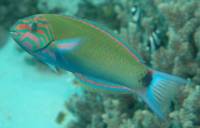 The moon wrasse, Thalassoma lunare, is a species of wrasse native to the Indian Ocean and the western Pacific Ocean. It is an inhabitant of coral reefs and surrounding areas at depths from 1 to 20 m (3.3 to 65.6 ft). This species can reach 45 cm (18 in) in total length. The juvenile is blue on the lower half of its body, with a black spot in the middle of the dorsal fin and a black blotch on the caudal fin base. As it matures, the spot turns into a yellow crescent, hence the name. The body is green, with prominently marked scales. Coloration of the head ranges from blue to magenta, with a broken checkerboard pattern. Moon wrasses are active fish, said to be moving all day long. They are also territorial, nipping, chasing, and otherwise harassing fish that get in their way. Moon wrasses may live up to a decade in captivity, although this is shorter in the wild. They are popular fish in the aquarium trade, due to their hardiness, bright colors, and engaging behavior. They are renowned for their ability to tolerate spikes in nitrate.
The moon wrasse, Thalassoma lunare, is a species of wrasse native to the Indian Ocean and the western Pacific Ocean. It is an inhabitant of coral reefs and surrounding areas at depths from 1 to 20 m (3.3 to 65.6 ft). This species can reach 45 cm (18 in) in total length. The juvenile is blue on the lower half of its body, with a black spot in the middle of the dorsal fin and a black blotch on the caudal fin base. As it matures, the spot turns into a yellow crescent, hence the name. The body is green, with prominently marked scales. Coloration of the head ranges from blue to magenta, with a broken checkerboard pattern. Moon wrasses are active fish, said to be moving all day long. They are also territorial, nipping, chasing, and otherwise harassing fish that get in their way. Moon wrasses may live up to a decade in captivity, although this is shorter in the wild. They are popular fish in the aquarium trade, due to their hardiness, bright colors, and engaging behavior. They are renowned for their ability to tolerate spikes in nitrate.
